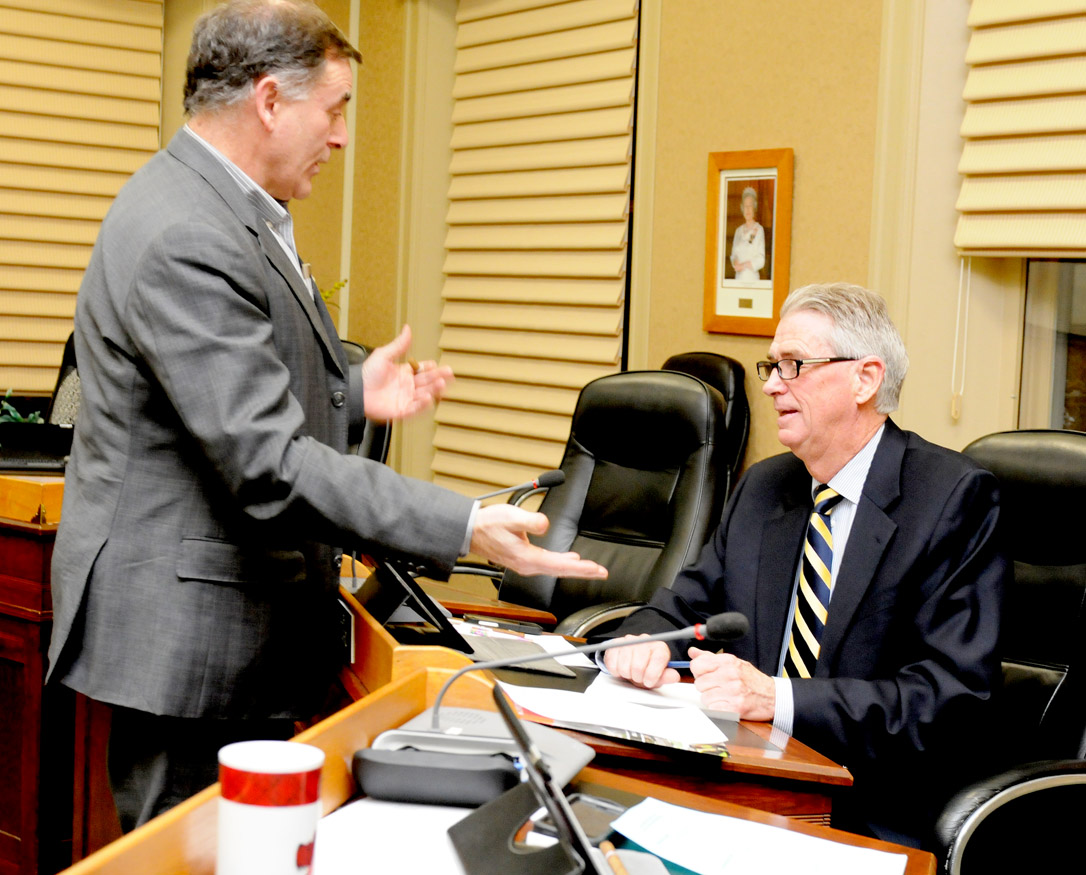
(City corporate services director David Dick, left, discusses the Victoria Avenue grant with Councillor Tom Blanchard.)
To the casual observer of city hall, the whole thing sounds a tad wonkish.
OK, maybe more than a tad.
But there is merit in persisting arguments about the need for a separate oversight committee for Brockville's water system.
Councillor Tom Blanchard was the latest to reiterate that call during last night's council meeting, an argument he pursued at length with city corporate services director David Dick afterwards.
The subject this time was the grant the city is getting from the province to continue modernizing the pipes under Victoria Avenue.
No one, Blanchard included, has any beef with getting money from the province, of course; Blanchard's quarrel is with how that money will be divvied up among the different city hall silos.
He summed it up for me by pointing to the staff report.
Before the city got the good news from the province, officials expected to divvy up the cost of the project this way:

The “grants” line item represents money city hall expected to get, either through gas tax revenues or other sources, and funnel through its operating budget. The other two portions appear to be split with relative fairness between the separately accounted water and sewer budgets.
Without those “grants,” would the city have done the work with the top line item funded directly by taxpayers? Good question.
Now, the city will get up to $734,040 from the province, or roughly 90 per cent of the total project cost, revised at $815,600:

So, the revised project cost breakdown has that entire $734,040 funnelled through the city portion of the budget, while the rest of it, albeit much smaller portions, come from water and wastewater.
In other words, city officials are funnelling the grant in such a way as to ensure the Victoria Avenue work does not cause a hit on the tax rate; meanwhile, all the Brockville money committed to the project is coming from the water and sewer budgets.
Technical stuff, you say? Absolutely. But Blanchard's point is simply that a big grant for a sewer and water pipe project should benefit, in some way, the sewer and water budgets.
“All of the free money went to the city and none of it went to the water and wastewater,” Blanchard reiterated Wednesday.
Blanchard, a longtime critic of the water and sewer budgets from back in his days at the chamber of commerce, is quick to stress that the decision illustrated above may in fact be the right one.
The point is we don't know that without a proper public debate.
“Somebody made that decision and it wasn't at the council table,” said Blanchard.
“Is that taxation without representation?” I asked him Tuesday night.
“Exactly,” he replied.
Well, one might argue that really depends on the actual impact, on people's water and sewer bills, of taking all the city spending out of the water and sewer budgets.
It's less taxation, after all, but perhaps more user fees – which all come from the same wallet in the end.
The point is it's hard for the layperson – heck, even for the civic affairs nerd like yours truly – to figure out what that impact is. And if it's a small dent on the water bill in this instance, maybe the next decision will result in a bigger dent.
It's not inconceivable to think of cases where an expense might have a smaller impact on the end payer when spread out over the tax base, as opposed to water and sewer bills.
But we won't know about it until people of good faith are given the task of hashing it out in public.
Yes, it's hopelessly wonky, but sometimes careful civic management has to be tedious.